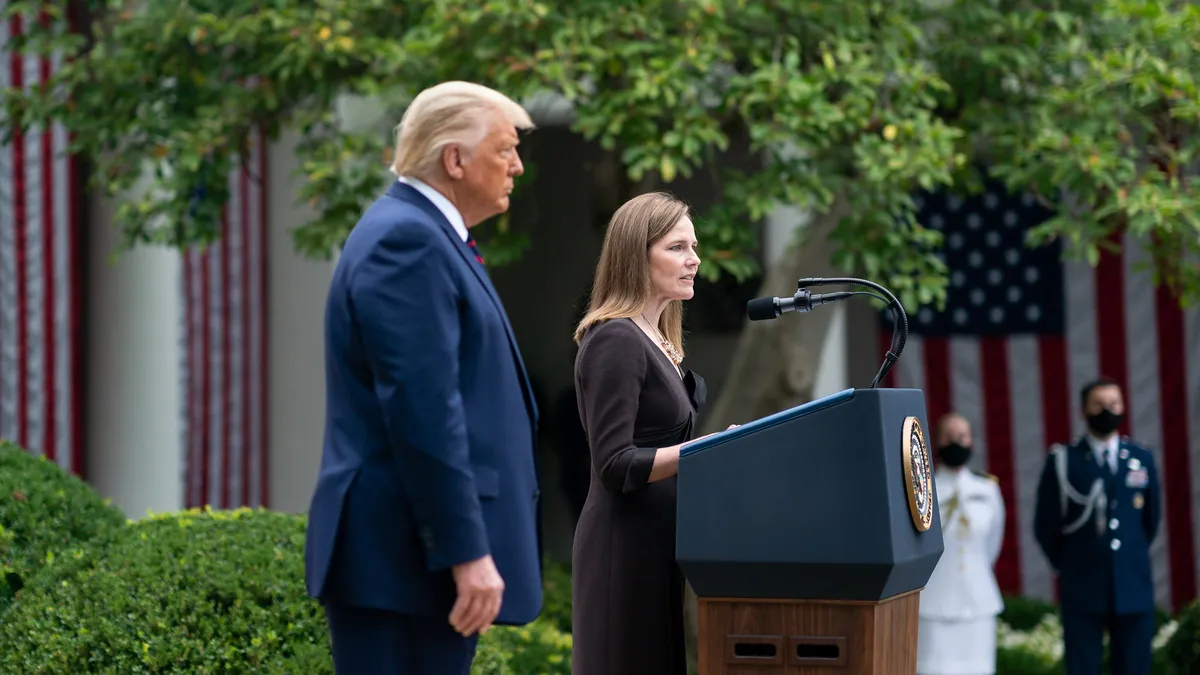Judge Amy Coney Barrett, President Donald Trump's pick to succeed Justice Ruth Bader Ginsburg on the U.S. Supreme Court, could bring an employer-friendly shift to the High Court, management-side attorneys say.
Barrett, a 7th U.S. Circuit Court of Appeals judge, was nominated just months after the end of the High Court's consequential 2019-2020 term, which saw the court deliver a landmark decision in Bostock v. Clayton County, Ga., holding that employment discrimination based on a worker's sexual orientation or gender identity is illegal under Title VII of the 1964 Civil Rights Act.
While the decision to appoint Barrett has created political controversy in the U.S. Senate, management-side attorneys who spoke to HR Dive indicated that, if confirmed, Barrett's could lead to an employer-friendly shift.
"Generally, employers should be pleased with Judge Barrett's nomination," Eric B. Meyer, partner at FisherBroyles, said in an email. "Her employment law decisions do not suggest any predisposition towards employees or employers. Rather, she faithfully follows legal precedent to adjudicate the lower court's decision."
One area that might illustrate Barrett's record on employment law cases is the issue of the "gatekeeper standard" on whether claims are able to reach federal court, said Randy Coffey, partner at Fisher Phillips; "There are indications that, like many judges, she will apply the constitutional standards of standing and mootness." If a question arose as to whether statutory language allows a case to be brought forward, Barrett "would be one to scrutinize the language," Coffey added.
Arbitration may be another such area. Meyer previously wrote about Barrett's 2018 opinion for the court in Herrington v. Waterstone Mortgage Corporation, in which the 7th Circuit held that the availability of class or collective arbitration "is a threshold question of arbitrability" and that a district court, rather than an arbitrator, would need to evaluate the plaintiff's employment contract to determine whether it permitted class or collective arbitration.
The Herrington decision was handed down after the Supreme Court's decision in Epic Systems v. Lewis, and it was significant because it weighed in on a question not yet answered by the High Court, Meyer said. Attorneys with Fisher Phillips cited Herrington as one of a selection of opinions indicating that Barrett may favor arbitration over certain class and collective action issues.
But when it comes to the interpretations of federal agencies like the U.S. Equal Employment Opportunity Commission, it is not entirely clear where Barrett might stand on cases in which a statute defers to agencies to determine rules, Coffey said. It also is unclear how Barrett might rule on certain discrimination claims, particularly within the context of Title VII, he added. This year, Barrett wrote the 7th Circuit's opinion affirming a plaintiff's $300,000 jury award in a national-origin discrimination complaint in Vega v. Chicago Park District.
Barrett, notably, was not part of the 7th Circuit's en banc decision in Hively v. Ivy Tech, in which it concluded that discrimination on the basis of sexual orientation violated Title VII, Meyer said. Hively would go on to form part of the circuit split that preceded Bostock.
"It's always dangerous to make predictions in that type of area," Coffey said when asked about how Barrett might rule in any upcoming Supreme Court decisions regarding the Title VII issues explored in Bostock. That could be important to note as the court faces potential follow-up cases stemming from its ruling earlier this year. "I don't know exactly where she would fall on that issue," he said, adding that Barret has a "standard and legitimate view of the scope of Title VII."
Ultimately, though it may be fair to say that Barrett would lead the court to take a more conservative and pro-employer outlook on some aspects of employment, "it's always somewhat dangerous to rely on earlier rulings," Coffey said, noting that Justice Neil Gorsuch, a Trump administration appointee, issued the majority's ruling in Bostock.
"The body of work as a circuit court judge is certainly revealing, but the nominee's outlooks about how to go about judging and the philosophical influences that inform that approach to judging are probably more significant," Coffey said.





















